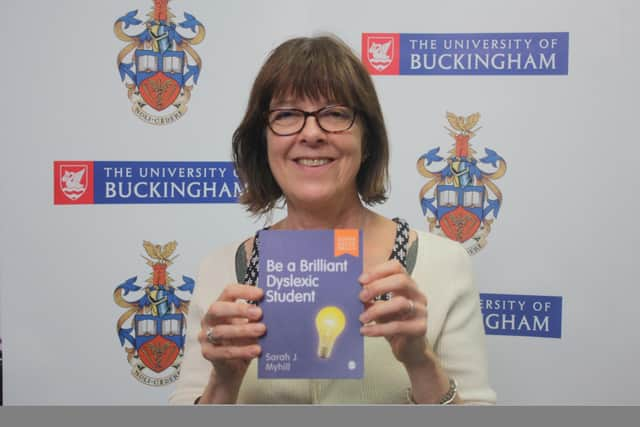Buckingham author 'passionate about helping dyslexic students'
This article contains affiliate links. We may earn a small commission on items purchased through this article, but that does not affect our editorial judgement.
and live on Freeview channel 276
Sarah Myhill’s book, Be a Brilliant Dyslexic Student, was born out her work at the University of Buckingham over the past six or seven years.
Dyslexia is a learning difficulty which affects reading and writing skills. Dyslexic people may have difficulty processing and remembering information they see and hear, which can affect learning.
Advertisement
Hide AdAdvertisement
Hide AdSarah, a dyslexic specialist tutor and lecturer, is passionate about raising awareness of the strengths of dyslexia, as well as of the effective study strategies that can support achievement.


Sarah said: "Dyslexia is a learning difference with a combination of strengths and weaknesses that affects around 15 to 20 per cent of the population.
"Almost half of dyslexic students are diagnosed when they reach university as they adjust to the increased academic workload."
But she had no intention of writing a book, until she was approached by Sage academic publishers to contribute one on dyslexia, as part of their series, Super Quick Skills.
“I’d never have written it otherwise,” she said.
Advertisement
Hide AdAdvertisement
Hide Ad“They gave me the title, Be a Brilliant Dyslexic Student, which I thought was great. Because I’m passionate about helping the students, and I think every student I’ve seen has left with a 2:1 or a First – so the support works.”
Sage provided some of the illustrations for the book, and Sarah, who is a former architect, also did a lot of her own.
Designed in the format of a workbook, with activities and checklists to fill in, the book explains what dyslexia is and how students can recognise and work to their strengths.
The areas covered include reading, writing, memory, concentration, and time management techniques, which would be helpful for all students, not just those with dyslexia.
Advertisement
Hide AdAdvertisement
Hide AdIt’s been a huge project that has taken up all of Sarah’s weekends.
“Although I’ve got the knowledge from my work, it’s another thing entirely to write a book,” she said.
“I’m completely self taught. I’ve learned everything I know from my own research and from my passion to help the students
“I’ve done lots of continuing professional development into concentration issues, I’ve done a lot of research into attention issues.
Advertisement
Hide AdAdvertisement
Hide Ad“ I found that mindfulness has been shown to be really helpful for ADHD and concentration issues, and students that practise it seem to be getting higher grades because they’re strengthening the focus area of their brain – so this summer I trained to be a mindfulness teacher at Oxford University, and there’s a chapter on concentration in the book.”
As well as her experience with Buckingham students, Sarah has had plenty of experience of dyslexia in her own family, as her husband, brother and two of her three children are dyslexic.
Sarah said: “I think all the students I see with dyslexia are probably brighter in some ways than other students, because they’re very creative, making connections between ideas.
“I think the creative thinking and the problem solving skills that go with dyslexia are really important in today’s society.
Advertisement
Hide AdAdvertisement
Hide Ad“Richard Branson is dyslexic, Albert Einstein was, and they actually say that almost every invention in the world has been made by somebody with dyslexia, which is interesting.
”Twenty per cent of doctors are dyslexic."
But dyslexia is not even recognised as in many other countries, said Sarah, so many international students have no idea they have the condition.
She said: “It breaks your heart to see them come through and they go, ‘Oh, I’m not very clever.’ And then I screen them for dyslexia and I go, ‘You are, you’ve just got dyslexia.’ And they’ve never heard of it, their families don’t want to know.
“But with a bit of boosting their self-esteem and positive self talk, from getting low grades they can change within a term to getting Firsts, because of their motivation and self-esteem.”
Advertisement
Hide AdAdvertisement
Hide AdNow Sarah hopes her book will allow her to reach a wider audience and hopefully empower more students across the UK and internationally to boost their self-confidence and their grades.
There will be a book launch at the university within the next few months and SENCos from local schools will be invited to attend.